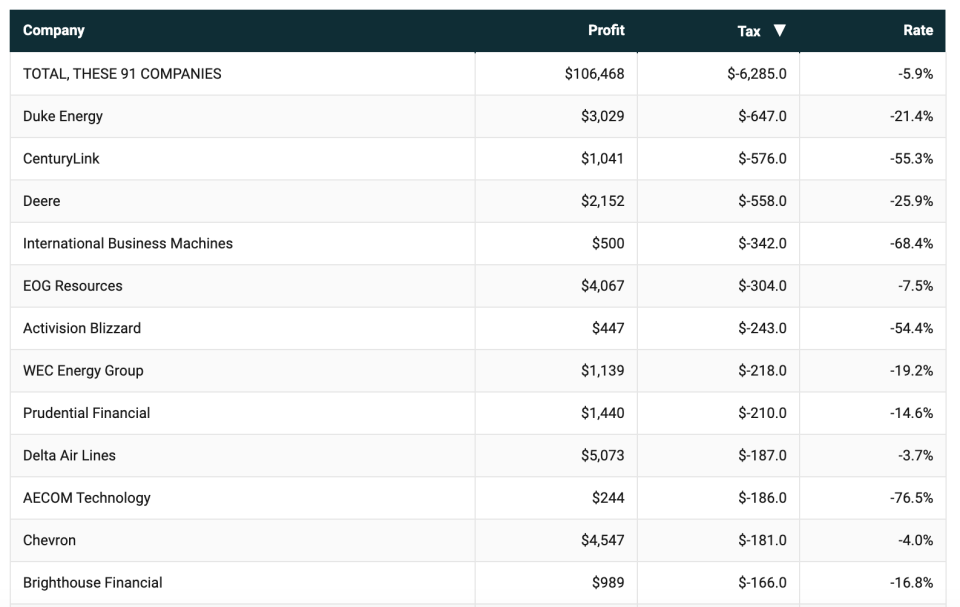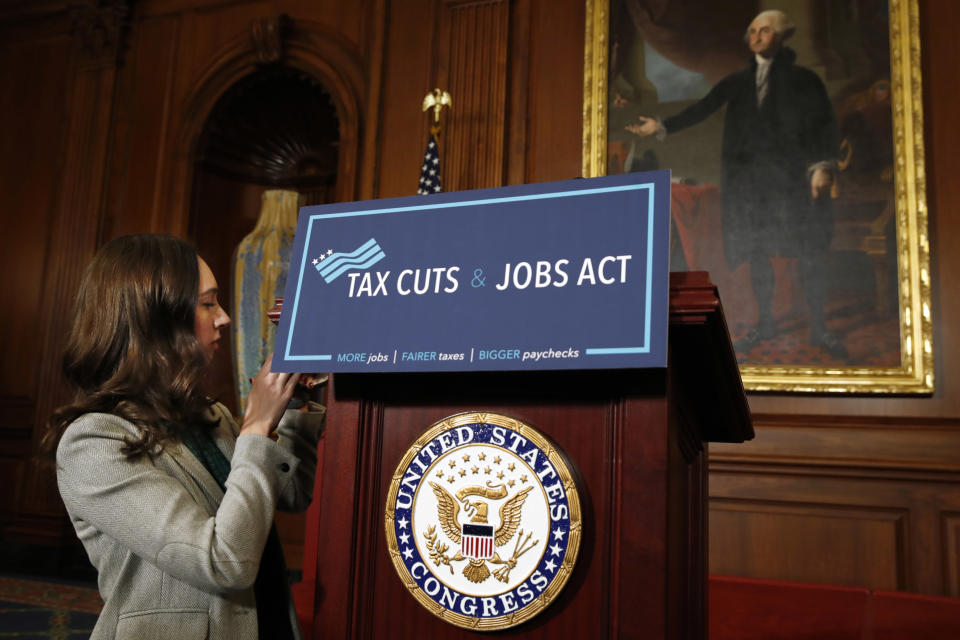91 profitable Fortune 500 companies paid $0 in taxes in 2018 under Trump's tax law
Under the Tax Cuts and Jobs Act, 91 profitable Fortune 500 companies paid $0 in taxes on U.S. income in 2018, according to a new report from the Institute on Taxation and Economic Policy (ITEP). Across all 379 profitable companies in the Fortune 500 the effective tax rate was just 11.3%, just over half the 21% tax rate under the law.
“In 2018, the 379 companies earned $765 billion in pretax profits in the United States,” the report noted. “Had all of those profits been reported to the IRS and taxed at the statutory 21% corporate tax rate, the 379 companies would have paid almost $161 billion in income taxes in 2018.”
Instead, the companies only paid $86.8 billion, roughly 54% of what they owed.
A ‘pernicious effect’
But how?
Matthew Gardner, senior fellow at ITEP and lead author of the report, says that what companies are doing is “entirely legal” — but that they can avoid paying taxes thanks to tax breaks.
“A whole host of tax breaks in the code collectively have this pernicious effect,” Gardner said. But he added, though legal, “this doesn’t exonerate these companies from wrongdoing.”
“What we are seeing is a product of the actions of Congress, aided and abetted by corporate lobbyists,” he explained. “This is the predictable consequence of creating tax breaks for any activity you can think of.”
This trend is supported by data from the IRS. In 2018 — the first year the TCJA was in effect — the Treasury Department collected $91 billion less than it did in 2017.
In 2017, the IRS collected over $338.5 billion in income taxes (before refunds) from businesses. That number dropped by 22% to about $262.7 billion for fiscal year 2018. In comparison, in FY 2016, income taxes collected from corporations was on par with 2017, at $345.6 billion.
The 2018 figures represent the lowest amount the Treasury has collected from business in nearly a decade; in 2011 the IRS pulled in $242.8 billion from corporations’ income tax.
“It’s a very old problem,” said Gardner.
Gardner says that since ITEP started tracking effective tax rates in 1982, “we’ve never seen an effective tax rate as low as the one we just found.”
“From that perspective, it seems like there’s never been a time in the modern era when companies have been so successful in avoiding corporate taxes,” he explained.

Gardner cautions that this is the first year of data under the new tax regime; it will take years to see if TCJA allows more and more companies to avoid paying taxes.
Still, that’s five times the number of companies that avoided paying corporate taxes on average from 2008 to 2015. During that period, 18 companies managed to pay 0% or less (with their total average effective tax rate over 8 years being roughly -4%).
“We did not make it better,” Gardner said. “Whether it got made worse remains to be seen. But Congress doesn’t seem to have done anything to meaningfully repair the problem.”
Increasing refunds
Companies are not only paying less in taxes; the government is also giving more tax breaks.
Last year, the IRS refunded businesses $60 billion for a net total of $202.7 billion collected from corporations. In 2017, the refund figure totaled roughly $45 billion for a net collection of $293.6 billion.
According to ITEP, tax subsidies for the 379 companies totaled $73.9 billion with half of the total tax-subsidy dollars — a total of $37.1 billion — going to just 25 companies. ITEP’s research finds that each of those companies had more than $650 million in tax breaks last year.
“Bank of America topped the list of corporate tax-subsidy recipients with more than $5.5 billion in tax subsidies in 2018,” the report stated. “Other top tax subsidy recipients included JP Morgan Chase ($3.7 billion), Wells Fargo ($3.2 billion), Amazon ($2.4 billion), and Verizon ($1.7 billion).” Verizon is the parent company of Yahoo Finance.
Proponents of the tax law said that it would increase corporate investment in the economy, spurring growth.

And while capital expenditures did grow at the fastest pace in 25 years in 2018, share buybacks among publicly-traded companies have also gotten to the $1 trillion level, according to Goldman Sachs. S&P 500 companies bought back $833 billion in stock in 2018, the firm said.
“Public companies will repurchase shares (or pay out dividends) with excess cash when they feel investing for growth and financing M&A don’t offer attractive returns for the risk,” Yahoo Finance’s Sam Ro explained. “It’s a controversial and often politicized use of cash since it’s considered a less productive option that enriches shareholders.”
Furthermore, declining tax revenue has only widened deficits, as national debt has ballooned up over $23 trillion.
But while companies were able to avoid paying taxes thanks to the new Republican tax law, the IRS pulled in roughly $2 trillion from individual tax returns, a leap of nearly $100 billion from the amount collected in 2017.
While the majority of Americans did get a tax cut, many bemoaned receiving smaller-than-anticipated refunds or even being hit with a “surprise” tax bill.
2020 candidates weigh in
Presidential candidates Bernie Sanders and Elizabeth Warren have slammed corporations for their tax avoidance, adding corporate tax plans to the list of campaign proposals.
Warren proposed a new corporate tax that would pull in an estimated $1 trillion in revenue. In a Medium post, Warren’s team stated that the “Real Corporate Profits Tax” would only apply “to companies that report more than $100 million in profits — about the 1200 most profitable firms in the country last year. That first $100 million is left alone, but for every dollar of profit above $100 million, the corporation will pay a 7% tax. Any company profitable enough to hit the Real Corporate Profits Tax will pay that tax in addition to whatever its liability might be under our current corporate tax rules.”
Team Warren added that the tax would “make our biggest and most profitable corporations pay more and ensure that none of them can ever make billions and pay zero taxes again.”
Over at the Sanders campaign, the senator proposes a reversal of Trump’s tax law, “closing corporate tax loopholes to raise up to $3 trillion over 10-years,” as part of his Corporate Accountability and Democracy plan.
Under his plan, the corporate tax rate would be restored to 35%, and would eliminate “virtually all corporate tax breaks and loopholes.”
Kristin Myers is a reporter at Yahoo Finance. Follow her on Twitter.
Read more:
Not just Amazon: 60 big companies paid $0 in taxes under Trump law
Amazon will pay $0 in taxes on $11,200,000,000 in profit for 2018
Here’s what happens to a candidate’s money when they drop out
Charlamagne tha God addresses black voters considering Trump: 'Who wants to be a rich slave?'
US taxpayers spent almost $1 billion incarcerating innocent black people
Read the latest financial and business news from Yahoo Finance
Follow Yahoo Finance on Twitter, Facebook, Instagram, Flipboard, LinkedIn, YouTube, and reddit.
Listen to this article

 Yahoo Finance
Yahoo Finance 

